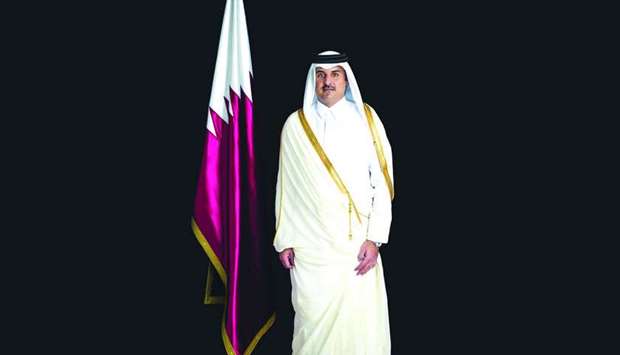*Visit aimed at giving a new momentum and a strong impetus to the existing co-operation between Qatar and S Korea, Japan and China in various fields
His Highness the Amir Sheikh Tamim bin Hamad al-Thani embarks on Sunday on a three-nation Asian tour that includes South Korea, Japan and China.
The visit is aimed at giving a new momentum and a strong impetus to the existing co-operation between Qatar and the three countries in various fields.
In the first leg of the tour His Highness the Amir will visit the friendly South Korea.
The tour emphasises the keenness of the wise leadership on promoting and enhancing the relations of Qatar with all sisterly and friendly countries, while exerting utmost efforts and harnessing all potentials to build a modern Qatar, promote its development, achieve prosperity and welfare for its citizens and residents and secure the homeland against all dangers, challenges and threats.
During his visit to South Korea, the Amir will hold official talks with President Moon Jae-in on means of developing and bolstering bilateral relations in all fields, and discuss regional and international issues of mutual concern.
Qatar values its distinct relations with South Korea which are witnessing continuous development. The Qatari-South Korean relations are characterised by strength and development over the past 45 years. The two countries set up diplomatic relations in 1974. Since then, bilateral relations have witnessed many political, economic and cultural developments and important visits of officials between the two countries.
Significant among them are the visits of His Highness the Amir Sheikh Tamim bin Hamad al-Thani to Seoul in November 2014, and the visit of former South Korean President Park Geun-hye to Doha in March 2013. The visits followed a number of other important visits, including that of His Highness the Father Amir Sheikh Hamad bin Khalifa al-Thani to South Korea in 1999, and the visit of Her Highness Sheikha Moza bint Nasser, the Chairperson of Qatar Foundation for Education, Science and Community Development, in 2015.
There also have been many important visits at the level of the prime minister and ministers, all of which have contributed to the promotion of bilateral relations to the level of a strategic partnership, led by the Qatar-Korea High-level Strategic Co-operation Committee, which was established in 2012. The committee covers various areas of common concern, especially in the fields of construction, trade, investment, agriculture, science and technology, information and communication technology, public health, medical industry and education.
Bilateral relations have continued to develop in a rapid and orderly manner, reflected in a series of agreements, memorandums of understanding and strategic co-operation signed between the two countries in the economic, trade, cultural, media, sports and security fields, healthcare, medical science and air transport, investment promotion, avoidance of double taxation, research on the peaceful uses of nuclear energy, as well as technology and innovation.
The close trade relations between Doha and Seoul contributed to increasing the volume of trade exchange between the two countries, which reached nearly $12.5bn last year. South Korea is Qatar's second biggest trading partner.
Qatar supplies South Korea with one-third of its LNG consumption under a long-term agreement that provides stability to that country's industrial and residential energy needs. The gas is being transported to Korean ports by a fleet of state-of-the-art tankers built by Korean companies with multi-billion dollar investments. Qatar is also South Korea's sixth-largest oil exporter.
Meanwhile, Korea exports many goods to Qatar, including automobiles, heavy construction equipment and electrical transformers. Many Korean companies are active in Qatar, including 34 companies wholly owned by Korean investors with more than $1bn in capital, while there are 115 joint Qatari-Korean companies with a capital of nearly $2bn. Some 15 Korean companies are involved in Qatari infrastructure projects such as Doha Metro, Lusail Expressway and Umm Al Houl Energy and Desalination Plant.
Qatar and Korea join hands in adopting and supporting the universal principles calling for the preservation of the values of peace, justice, mutual respect and the right of peoples to live in dignity, freedom, self-determination, and the maintenance of international peace and security.
In this context, South Korea calls for resolving the Gulf crisis through dialogue between the parties concerned, while Qatar welcomed the agreement reached by South and North Koreas on the denuclearisation of the Korean Peninsula and the relevant measures in the interest of peace and stability in the region.
The Republic of Korea is located in East Asia. It occupies the southern portion of the Korean Peninsula, which extends some 1,100km from the Asian mainland. This mountainous peninsula is flanked by the Yellow Sea to the west, and the Sea of Japan to the east. Its southern tip lies on the Korea Strait and the East China Sea. It has a population of 51mn people, most of whom are concentrated in the capital Seoul, and other major cities, such as Busan, Daejeon and Incheon.
In the four decades following the Korean War in the 1950s, South Korea has made spectacular economic leaps and emerged as one of the greatest economic success stories of the century. Its GDP per capita increased faster than any of its neighbours, and it was able to achieve economic growth that made it Asia's fourth largest economy.

